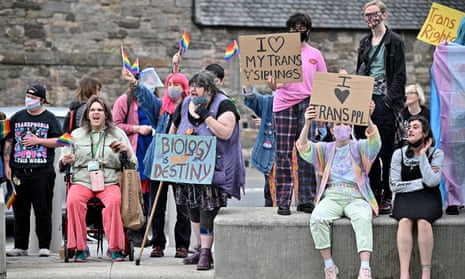A judge has approved a decision to allow any transgender person in Scotland to select male or female as their sex in this year’s census without holding a gender recognition certificate.
Lord Sandison, a civil court judge sitting in Edinburgh, threw out a legal challenge by the feminist group Fair Play for Women, which had gone to court to block that question from being asked.
Fair Play for Women argued that people were lawfully allowed to answer that question based only on their legally recognised sex, either from their birth certificate or gender recognition certificate.
National Records for Scotland, the government agency, will now publish census returns asking the question “what is your sex”, and offer two options of male and female. About 2.5m households will be asked to complete it. Its guidance reads: “If you are transgender, the answer you give can be different from what is on your birth certificate. You do not need a gender recognition certificate.”
In a judgment issued 14 days after hearing the challenge, Sandison ruled there was no legal requirement to insist on legal proof of sex for the census, which will be on 20 March.
Sandison said government agencies recognised sex and gender in different ways, and as the census legislation did not adjudicate one way or the other on the issue, Scottish ministers were able to set the question this way.
“In the modern age, where social change has meant that such issues are much more openly and widely discussed and debated, I would find it impossible to find that the word ‘sex’ in a statute enabling the general population to be asked questions for the wide and general purposes for which a census is conducted falls to be regarded as restricted in the sense for which the petitioner contends,” he wrote.
“Rather, I would accept the suggestion that biological sex, sex recognised by law, or self-identified (or ‘lived’) sex as at the date of the census are all capable of being comprehended within the word.”
Fair Play for Women said they were disappointed with the ruling and would be pressing for an urgent appeal. “The guidance proposed for the sex question will jeopardise the collection of accurate data on sex in the Scottish census and erodes the harmonisation of data collected via censuses across the UK,” the group said.
Vic Valentine, of the pro-trans campaign group Scottish Trans Alliance, welcomed the judge’s ruling. “Scotland’s census is meant to count everyone in Scotland as who they are on census day, and the guidance provided reassures trans men and trans women that this is the same for them as it is for everyone else,” they said.
“This is an important decision: clearly stating that all trans men and trans women are able to be counted on the census as who they are, not just those who have changed the sex on their birth certificate.”
